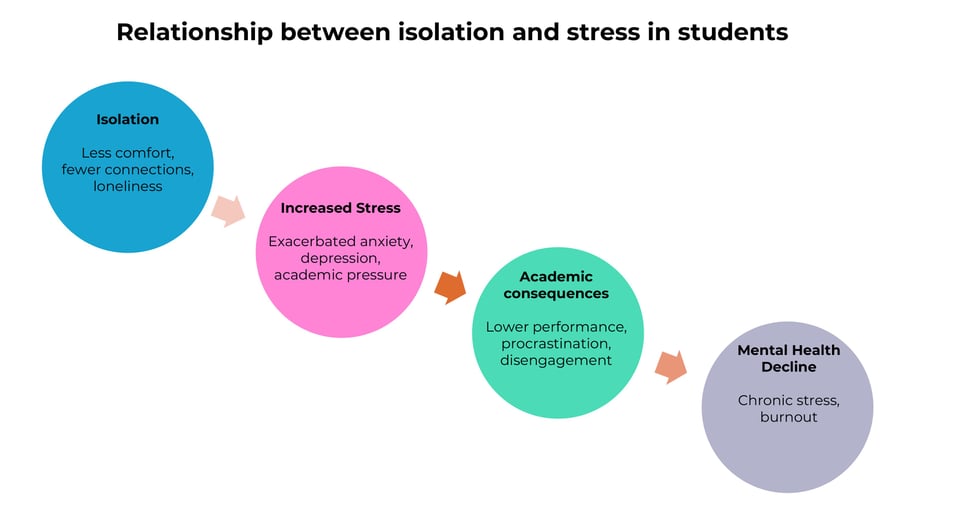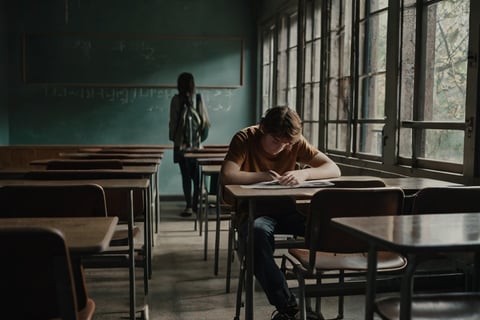How does social isolation impact student stress levels?
Discover how social isolation impacts student stress levels and mental health. Explore the challenges students face in academia, from academic pressures to personal struggles, and how these are exacerbated by isolation. Learn how social disconnection affects well-being and performance, and gain insights into how addressing isolation can help reduce stress. This article provides valuable strategies to support students and improve their mental health in a competitive academic world.
11/13/20246 min read
Social isolation is a growing concern for students, and its impact on mental health and stress levels cannot be underestimated. The unique challenges that students face in an academic environment, including academic pressures, social expectations, and personal struggles, are compounded when students experience isolation. Research from various studies highlights that the mental and physical toll of social isolation can be significant, leading to heightened levels of anxiety, depression, and other stress-related issues.
Our article dealing with the impact of stress on student mental health and strategies for its prevention emphasizes the need to address isolation early to prevent mental health crises.
Also, we point you to our article on the mental health risks of chronic stress in students where we observe the long-term implications of unmanaged isolation, particularly for students in high-pressure academic environments.
Social disconnection can worsen the challenges of academic stress, leading to poor academic performance and health. It is one of the most common couses of stress among the college freshmen.
Furthermore, prolonged stress from isolation can lead to chronic mental health issues that affect not only academic success but also personal relationships and overall well-being. By addressing the factors that contribute to isolation and providing students with the tools to create meaningful connections, academic institutions can play a crucial role in mitigating these risks.
How Does Social Isolation Impact Student Stress Levels?
Social isolation has a profound impact on student stress levels, affecting students both psychologically and physiologically. When students are isolated, they lack the crucial emotional and social support systems that help mitigate stress. The absence of meaningful relationships can make academic and personal challenges feel more overwhelming, leading to a higher perception of stress.
Research shows that isolation contributes significantly to increased rates of anxiety and depression, both of which can affect students’ overall mental health and academic performance.
One of the key findings from studies conducted during the COVID-19 pandemic is that the lack of social interaction has a measurable effect on students' mental health. The global pandemic led to an increase in mental health disorders due to isolation and restrictions. The study found that isolation due to the pandemic contributed to a rise in anxiety and depressive symptoms, which were exacerbated among students.
As social interactions became limited, students were left to manage their academic, personal, and emotional challenges without the necessary support from friends, family, or peers. This isolation contributed to heightened levels of stress and deteriorating mental health conditions.
The experts who explored the effects of social isolation on student mental health identified it as a key predictor of stress, anxiety, and depression. Their research highlighted that the lack of social interaction among college students was linked to an increase in mental health diagnoses, including depression and suicidal ideation. The study indicated that students who were isolated for extended periods reported higher levels of stress and struggled with emotional well-being more than those who maintained active social connections. These findings suggest that the absence of a support network can have long-lasting consequences for students’ mental health and stress management.


Anxiety, Depression, and Cognitive Performance
Social isolation leads to a cycle of increasing anxiety and depression, which can significantly impair students’ cognitive abilities. Without social interaction and support, students often experience a heightened sense of isolation, which reinforces feelings of loneliness and emotional distress.
The prolonged absence of social connections can exacerbate emotional turmoil, leading to severe psychological conditions, including chronic anxiety and depression. These mental health challenges, in turn, negatively affect students’ academic performance.
In addition, cognitive functions such as memory, focus, and attention are often impaired by the constant stress caused by isolation. Students experiencing social isolation struggle with concentration and retention of information, making it difficult to excel in academic settings.
Students dealing with high levels of anxiety and depression often have difficulty maintaining focus on their studies. When cognitive resources are redirected toward managing emotional distress, students are unable to perform at their best academically.


Long-term Consequences of Isolation on Academic Success
The long-term consequences of social isolation are evident in the academic struggles that students face as they attempt to manage stress, anxiety, and depression.
The inability to connect with others and seek social support can impair students' ability to meet deadlines, complete assignments, and participate in group work. Over time, the cumulative stress and anxiety can lead to burnout, which significantly impacts students’ overall academic success and motivation.
Students who faced extended periods of isolation during college had lower academic achievements compared to their socially connected peers. The lack of social interaction not only hampers mental health but also affects the cognitive and emotional resilience needed to succeed academically.




The Role of Social Support in Reducing Stress
One of the most effective ways to mitigate the impact of social isolation on student stress levels is through social support. Having a strong social network, including family, friends, peers, and even academic advisors, plays a critical role in buffering the effects of stress.
Research shows that students who engage in positive social interactions are better equipped to cope with stress and anxiety.
Individuals who had strong social connections during the pandemic were more likely to report lower levels of anxiety and depression compared to those who experienced higher levels of isolation.
Furthermore, students who have access to supportive social networks are less likely to experience severe mental health outcomes, such as suicidal ideation. This underscores the importance of fostering social connections as a preventative measure to reduce stress and protect mental health.
Encouraging Social Interaction in Educational Settings
Educational institutions can play a vital role in supporting students by creating environments that encourage social interaction and connection. This can be done through organizing group activities, student clubs, and peer-support networks, which help students build relationships and combat isolation.
Research by Liu et al. (2019) highlights the benefits of peer support programs, which create spaces for students to connect with others facing similar challenges.
By fostering a supportive community, universities and colleges can create an environment where students feel more connected and less isolated. Encouraging social interaction within academic settings not only helps students manage stress but also improves their overall well-being and academic performance.






In conclusion, social isolation has a profound and lasting impact on student stress levels. The absence of social support and meaningful connections can exacerbate anxiety, depression, and cognitive challenges, which in turn affect academic performance. We may conclude that social isolation plays a significant role in the mental health struggles that students face today, especially in the context of the COVID-19 pandemic.
To mitigate these negative effects, educational institutions and communities must prioritize social connections and provide students with the necessary support to navigate their academic and personal challenges. By doing so, we can help students manage stress and foster better mental health in an increasingly isolating world.
For deeper dive into this subject, we would advise you to consult the following literature:


